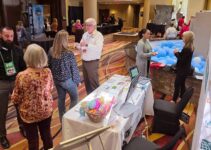The Municipal Clerk truly is a community’s jack-of-all-trades, often overseeing multiple departments and performing numerous tasks daily to keep local governments and public services running smoothly and efficiently. Conversations With Clerks is a continuing DeCoder series in which we talk with Municipal Clerks from across the country to learn more about their unique experiences and what it takes to be effective and successful in their roles.
This issue’s featured clerk:

Wendy Withers
Town Administrator/Town Secretary
Shady Shores, TX
Can you tell us a bit about your community?
Shady Shores, Texas, actually started out as a fishing camp town, and we sit on Lake Lewisville which is south of Denton. So originally little lots were sold around the lake to encourage people to come out and camp for relaxation and around those tiny lots, the township grew. It’s part of what we call Lake City with three other sister cities, which include Corinth, Hickory Creek and Lake Dallas — all of which have sort of a similar background. Shady Shores incorporated in 1960.We have a pretty rich history. Part of the town which we call our historic district has very many of the original homes. As we have grown, we now have an air park here where the residents have their own airplanes, and they have their own runway. We also have some half-million-dollar homes on up so it’s a very economically diverse community. We don’t have any retail stores. We’re strictly what we call a bedroom community kind of keeping that feel of relaxation. We like our folks that come from working in the city to feel like they’re in the country.
How did you get to your current position?
Someone once told me no one ever says they want to grow up and be a municipal clerk!
I am currently Town Secretary and Administrator which has me serving multiple roles and duties from records management to elections. I started in the water department doing billing when I first came back to Texas. When the current municipal clerk left, I took over her duties and started doing the job and just fell in love with it. That was back in 1996 and I’ve worked for a couple of other cities in between. I’ve been here about 10 years. I work with a great team from our council up to our county staff. They’re just fantastic.
What do you like most about the job?
I’d have to say that my favorite part of the job is educating our residents. The average citizen doesn’t often get an opportunity to interact with town government. And if they do, nine times out of ten it’s because something unpleasant has happened– because they got a ticket, or there’s a pothole that they want fixed or there’s a problem with their water, or their trash didn’t get picked up. So, I always tell my staff and I tell the council our job is to educate residents…how does the city work? What are we doing for you and your tax dollars?
Over the years, we have gotten to know many of our residents, and I love it. We know their grandchildren, when they are having visitors, even the names of their dogs.
What are some of the challenges of your position?
I would say working with public records and satisfying records requests. The number of requests seems to keep increasing while the timeframe to complete them shrinks. FOIA requests can be a big challenge because there are so many facets to narrowing down the scope of the request and sometimes that’s difficult.
In your time working with Shady Shores, how have you seen your position change?
When I first started in the town, the mayor had been here for about 50 years–the majority of time of the town’s existence. And while we had good people and processes, we just weren’t very up on technology. I think that the entire town was sharing one email address!
I was the only employee other than a part-time court clerk. Since that time, we’ve grown to about five on staff. Our council is very progressive in that we now live-stream our meetings. We have also invested in quite a bit of computer software that allows us to do our job and do it in a way that’s professional and best for the residents. Most of our community works from home and they expect a higher level of performance from the town staff.
Has the recent COVID emergency changed your job?
Absolutely… we don’t have snow days anymore! But some things are good, and some are bad. Before COVID, we probably would have stayed home and not worked in an emergency. Now we know that we can work from home — and we’ve changed all our processes so that if we had to, we could operate at the same high level off site. It’s still the nature of our job that we need to be here and interface with the citizens. But if it so happens that somebody needs to be home and work from home or do other things, we’re flexible in that respect. In some ways, it’s great. In other ways, you lose a little bit of that human connection when you don’t get to meet residents in person all the time.
How has having an online code changed your job?
When I first started as a municipal clerk, we had all these ordinances and books and if you wanted to know something you had to look at this paper list to go down the list to find an ordinance that you thought would answer a particular question. Then you would go and try to find it. Many times I remember thinking gosh, it would be great if there was just one place where you could easily find everything. And that’s when we started looking into codifying our ordinances and it changed my life. It really changed life for the residents too. Now they can go online and look at the code and it’s not some big mystery like we’re keeping all the ordinances locked away so the residents can’t see them.
How important do you think it is to keep your community’s code up to date?
It’s the most important thing – 100%. One thing I absolutely love is this new feature with General Code’s [eCode360] where I get my new ordinances online and they show up even before they notify us. Then the residents can look at those immediately once they get passed. It’s really great.
What advice would you give to a new municipal clerk or someone considering working in local government?
The first thing I would tell them would be to get connected with a support group. We have the Texas Municipal Clerk’s Association, and they were vital for me to learn how to do my job. Just knowing that there were other clerks that I could pick up the phone and say, ‘How do I handle this or that’ was fantastic. That help and support was key — especially when I was conducting my first election which was very daunting.
I’d also say, learn everything you can. Get any training you can. Things change so quickly in this business. You can’t just depend on everything to stay the same. Year to year you’ve got to refresh your education and keep up. Covid and technology have changed how we get information too, so now a lot of essential training is offered online. And if you have a small training budget, it can be easier and more affordable to take just an hour to do an online workshop.
Do you mentor any new clerks?
I currently mentor the municipal court administrator. She’s now gone through training for our succession plan. The plan is when I retire, she’ll take over and I work with her hand in hand to keep her abreast of everything I’m doing so she can step right in. We also have a list [of new clerks] that we have for our group, and anyone can post a question online and then other clerks will answer. So that’s another way we connect with and help new clerks.
How do you keep up on your own education and personal growth?
The Texas Municipal Clerk’s Association has several conferences during the year to help us keep up with legislative changes, public information changes, that type of thing. Then there’s the international clerk’s association that I’m a member of. There’s also the Texas City Managers Association which often offers one-hour webinars that you can attend on a particular subject. So, I’d say attending those conferences and networking with different clerks are the most valuable things to me.
Any final advice?
I think [to be a good municipal clerk] you must address residents with honesty and integrity. Most residents, as I said earlier, come to see us only when they are having a problem. You can’t always give them what they want. But it’s important to work with them through the problem, help them understand the process and have them leave your office knowing that they have been heard. If you can do that, you will be successful.


